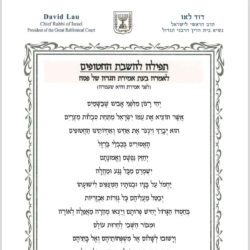| Source (Hebrew) | Translation (English) |
|---|---|
אַחֵֽינוּ כׇּל־בֵּית־יִשְׂרָאֵל הַנְּתוּנִים בְּצָּרָה וּבְשִּׁבְיָה הָעוֹמְדִים בֵּין בַּיָּם וּבֵין בַּיַּבָּשָׁה הַמָּקוֹם יְרַחֵם עֲלֵיהֶם וְיוֹצִיאֵם מִצָּרָה לִרְוָחָה וּמֵאֲפֵלָה לְאוֹרָה וּמִשִּׁעְבּוּד לִגְאֻלָּה הָשְׁתָּא בַּעֲגָלָא וּבִזְמַן קָרִיב וְנֹאמַר אָמֵן׃ |
Our siblings, the whole house of Yisrael, who are in distress and captivity who wander over sea and over land, may the Maqom[1] lit. the Place, an epithet for the Divine in rabbinic Judaism. have mercy on them, and bring them from distress to comfort, from darkness to light, from subjugation to redemption, now, swiftly, and soon. and may we say: Amen. |
“Aḥeinu” is the final prayer in a set of supplications recited on Mondays and Thursdays as the Torah scroll is being prepared to be returned to the Aron. The prayer is first found with variations in wording in the surviving manuscripts of the Seder Rav Amram Gaon (ca. 9th c.). The English translation here was modified by the transcriber from text shared by an anonymous translator. –Aharon Varady
Source(s)


Notes
| 1 | lit. the Place, an epithet for the Divine in rabbinic Judaism. |
|---|

“אַחֵֽינוּ | Aḥeinu (Our siblings)” is shared through the Open Siddur Project with a Creative Commons Attribution-ShareAlike 4.0 International copyleft license.








Leave a Reply